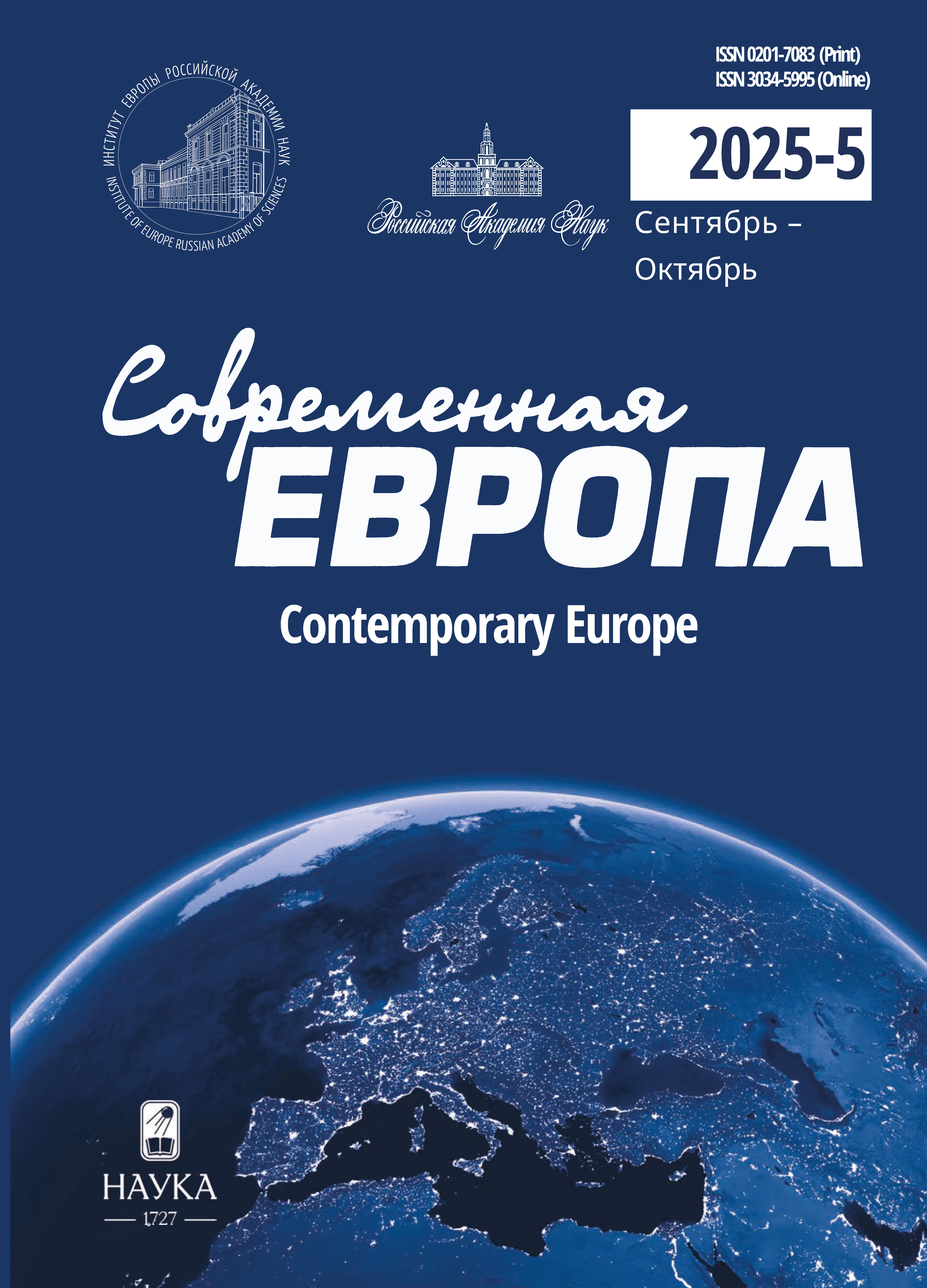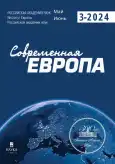Transatlantic Relations in the Perception of the American Ruling Elite: the Economic Aspect
- Authors: Goloub Y.G1, Shenin S.Y.1
-
Affiliations:
- Saratov State University
- Issue: No 3 (124) (2024)
- Pages: 111-124
- Section: Articles
- URL: https://rjsvd.com/0201-7083/article/view/652125
- DOI: https://doi.org/10.31857/S0201708324030094
- ID: 652125
Cite item
Abstract
The article is dedicated to the analysis of the perception in the United States of the J. Biden administration transatlantic policy in economic sphere and role of the European countries in forming the new system of international relations. Considering this policy in the context of the process of fragmentation of the global economy, the authors analysed the views of the most active political and ideological groups within the American ruling elite. Although the overwhelming majority of politicians and experts agree with the administration's strategic line on the formation of integrated transatlantic economy as the core of a new system of international relations, nevertheless, they see different ways to achieve this goal. Thus, centrist Democrats believe that the United States should use its leadership to organise rapid and tough integration; conservative Democrats emphasise gradual transition and a soft policy towards the EU; progressive Democrats insist on climate priorities; moderate Republicans are for strategic control without European access to the US market; conservative Republicans see the basis of the unification only in center-right unity. At the same time, most groups agree with the administration on key issues related to the need for EU countries to withdraw from the Chinese market, the use of protectionist tools, countering the antitrust policy of Europeans, etc. It is concluded that in its transatlantic economic policy the administration receives confident support from the main groups of the American elite.
About the authors
Yu. G Goloub
Saratov State University
Email: goloub@sgu.ru
Doctor of Sciences (History), Professor Head of the Department of International Relations and Russian Foreign Policy Saratov, Russia
S. Yu Shenin
Saratov State University
Email: shenins@yahoo.com
Doctor of Sciences (History), Professor Saratov, Russia
References
- Асадуллина А., Белоусов В. (2023) Глобальные тренды в развитии и регулировании технологий искусственного интеллекта. Российский внешнеэкономический вестник. № 9. С. 86-104.
- Голуб Ю., Шенин С. (2022) Администрация Байдена и проблемы «зеленого транзита». Мировая экономика и международные отношения. № 2. С. 5-14.
- Громыко Ал. (2023) Мировая пересборка: эмпирические данные в концептуальном поиске. Европейский ракурс. Вестник Санкт-Петербургского университета. Международные отношения. Т. 16. № 3. С. 209-225. DOI: https://doi.org/10.21638/spbu06.2023.301
- Громыко Ал.А. (2021) Субъектность Евросоюза между атлантизмом и европоцентризмом. Современная Европа. № 4. С. 10-25.
- Конопляник А. (2022) Американский СПГ в ЕС против России и самой Европы. Энергетическая политика. № 7. URL: https://energypolicy.ru/amerikanskij-spg-v-es-protiv-rossii-i-samoj-evropy/gaz/2022/18/18/ (дата обращения: 12.08.2023).
- Мельникова Ю. (2023) «Снижение рисков»: новая старая политика ЕС в отношении Китая. Российский совет по международным делам. 18.04.2023. URL: https://russiancouncil.ru/analytics-and-comments/analytics/snizhenie-riskov-novaya-staraya-politika-es-v-otnoshenii-kitaya/ (дата обращения: 12.08.2023).
- Портанский А.П. (2023) ЕС США: новые барьеры в торговле. Современная Европа. № 4. C. 119-131.
- Портанский А. (2021) ЕС и США: преодоление тяжелого наследия Д. Трампа. Российский совет по международным делам. 22.10.2021. URL: https://russiancouncil.ru/analytics-and-comments/analytics/es-i-ssha-preodolenie-tyazhelogo-naslediya-d-trampa/ (дата обращения: 12.08.2023).
- Шариков П. (2023) Отношения ЕС и США в конце 2022 начале 2023 гг. Европейский союз: факты и комментарии. Вып. 111. С. 105-108. URL: http://aevis.ru/upload/ckeditor/files/HOMep111_merged.pdf (дата обращения: 12.08.2023).
- Шумилин А. (2020) Трансатлантический излом на фоне пандемии. Научноаналитический вестник ИЕ РАН. № 3. С. 13-20.
- Bergmann M., Steinberg F. (2022) How to Avoid a Transatlantic Trade War over Climate. CSIS. 15.12.2022. URL: https://www.csis.org/analysis/how-avoid-transatlantic-trade-war-over-climate (accessed: 08.08.2023).
- Brands H. (2022) If China Invaded Taiwan, What Would Europe Do? AEI. 17.11.2022. URL: https://www.aei.org/op-eds/if-china-invaded-taiwan-what-would-europe-do/ (accessed: 08.08.2023).
- Asadullina A., Belousov V. (2023) Globalnye trendy v razvitii i regulirovanii tehnologij is-kusstvennogo intellekta [Global trends in the development and regulation of artificial intelligence technologies], Rossijskij vneshneekonomicheskij vestnik, 9, pp. 86-104. (In Russian).
- Bergmann M., Steinberg F. (2022) How to Avoid a Transatlantic Trade War over Climate, CSIS, 15.12.2022. URL: https://www.csis.org/analysis/how-avoid-transatlantic-trade-war-over-climate (accessed: 08.08.2023).
- Brands H. (2022) If China Invaded Taiwan, What Would Europe Do? AEI, 17.11.2022. URL: https://www.aei.org/op-eds/if-china-invaded-taiwan-what-would-europe-do/ (accessed: 08.08.2023).
- Golub Yu., Shenin S. (2022) Administraciya Bajdena i problemy «zelenogo tranzita» [The Biden Administration and the problems of "green transit"], Mirovaya ekonomika i mezhdunarod-nye otnosheniya, 2, pp. 5-14. (In Russian).
- Gromyko Al. (2023) Mirovaya peresborka: empiricheskie dannye v konceptual'nom poiske. Evropejskij rakurs [Global reassembly: Empirical data in conceptual pursuit. European perspective], Vestnik of Saint Petersburg University. International Relations, 16(3), pp. 209-225. DOI: https://doi.org/10.21638/spbu06.2023.301
- Gromyko Al. A. (2021) Subektnost Evrosoyuza mezhdu atlantizmom i evropocentrizmom [The subjectivity of the European Union between Atlanticism and Eurocentrism], Sovremennaya Evropa, 4, pp.10-25. (In Russian).
- Konoplyanik A. (2022) Amerikanskij SPG v ES protiv Rossii i samoj Evropy [American LNG in the EU against Russia and Europe itself], Energeticheskaya politika, 7. URL: https://energypolicy.ru/amerikanskij-spg-v-es-protiv-rossii-i-samoj-evropy/gaz/2022/18/18/ (accessed: 12.08.2023). (In Russian).
- Melnikova Yu. (2023) «Snizhenie riskov»: novaya staraya politika ES v otnoshenii Kitaya [«De-risking»: the new old EU policy towards China], Rossijskij sovet po mezhdunarodnym delam, 18.04.2023. URL: https://russiancouncil.ru/analytics-and-comments/analytics/snizhenie-riskov-novaya-staraya-politika-es-v-otnoshenii-kitaya/ (accessed: 08.08.2023). (In Russian).
- Portanskij A. (2021) ES i SShA: preodolenie tyazhelogo naslediya D. Trampa [The EU and the USA: overcoming the difficult legacy of D. Trump], Rossijskij sovet po mezhdunarodnym delam, 22.10.2021. URL: https://russiancouncil.ru/analytics-and-comments/analytics/es-i-ssha-preodolenie-tyazhelogo-naslediya-d-trampa/ (accessed: 12.08.2023). (In Russian).
- Portanskij A.P. (2023) ES SShA: novye barery v torgovle [EUUSA: new barriers to trade], Sovremennaya Evropa, 4, pp. 119-131. (In Russian).
- Sharikov P. (2023) Otnosheniya ES i SShA v konce 2022 nachale 2023 gg. [EU-US relations in late 2022 early 2023. The European Union: facts and comments], Evropejskij soyuz: fakty i kommentarii. 111. 2022/2023, pp. 105-108. URL: http://aevis.ru/upload/ckeditor/files/nomer111_merged.pdf (accessed: 12.08.2023). (In Russian).
- Shumilin A. (2020) Transatlanticheskij izlom na fone pandemii [Transatlantic fracture amid pandemic], Nauchno-analiticheskij vestnik IE RAN, 3, pp. 13-20. (In Russian).
Supplementary files











